Junior software developers are the budding talents in the tech industry, often tasked with supporting the development of software applications under the guidance of senior developers. Their role is crucial in maintaining the codebase, fixing bugs, and implementing new features as they grow their skills.
The skills required for a junior software developer include a solid understanding of programming languages like Java, Python, or C#, as well as foundational knowledge in algorithms and data structures. Additionally, they need to be adept at collaboration and open to continuous learning.
Candidates can write these abilities in their resumes, but you can’t verify them without on-the-job Junior Software Developer skill tests.
In this post, we will explore 8 essential Junior Software Developer skills, 10 secondary skills and how to assess them so you can make informed hiring decisions.
Table of contents
8 fundamental Junior Software Developer skills and traits
The best skills for Junior Software Developers include Programming Proficiency, Debugging Skills, Version Control, Database Management, Code Testing, Problem Solving, API Integration and Basic Security Knowledge.
Let’s dive into the details by examining the 8 essential skills of a Junior Software Developer.
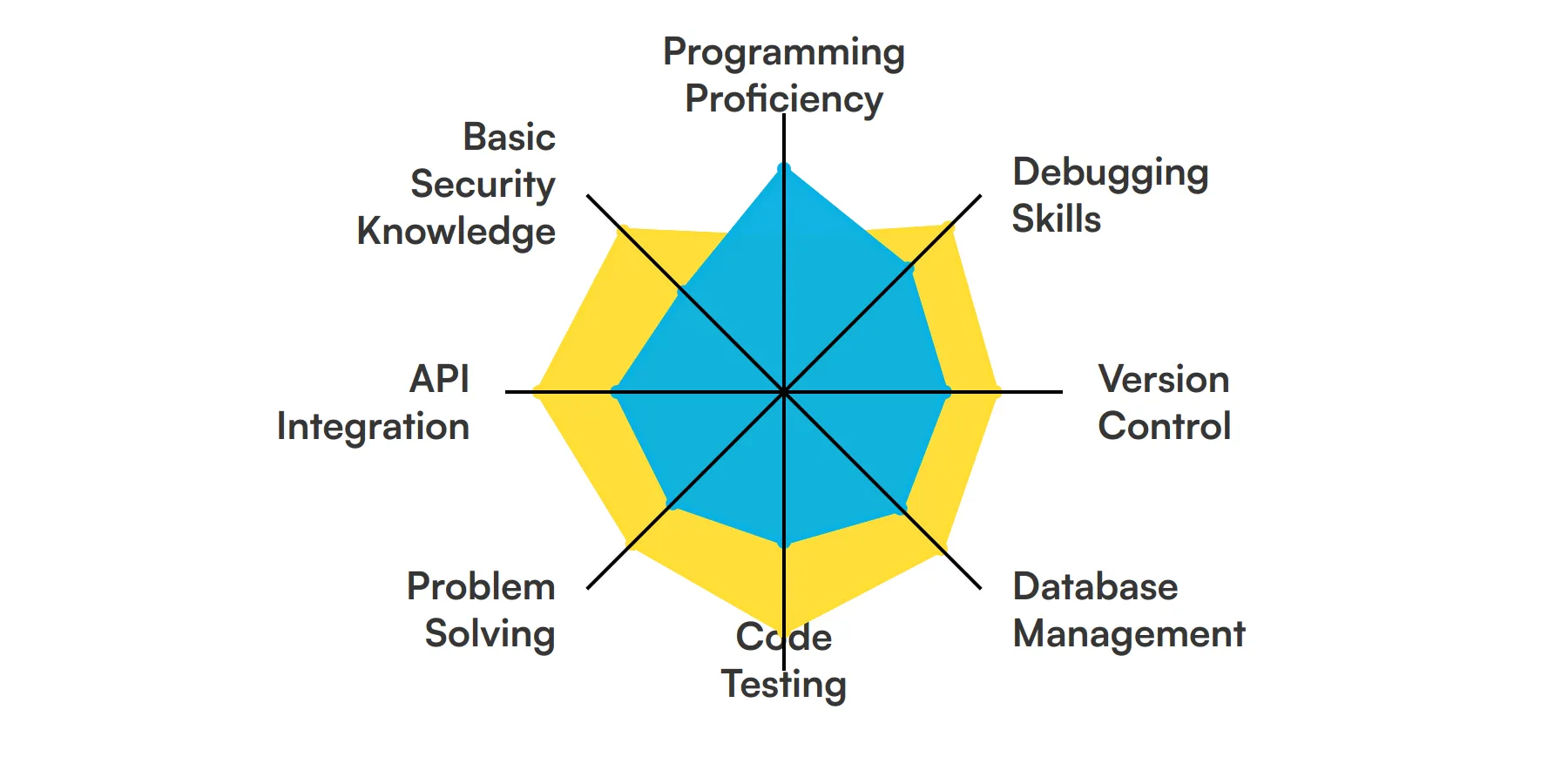
Programming Proficiency
A junior software developer must be adept in at least one programming language such as Java, Python, or C#. This skill is fundamental as it forms the basis of developing functional software solutions. Understanding syntax, semantics, and problem-solving through code is daily bread for developers.
For more insights, check out our guide to writing a Software Developer Job Description.
Debugging Skills
Debugging is critical for a junior software developer, as it involves identifying and resolving errors or bugs in the software. This skill ensures that applications run smoothly and efficiently, enhancing user satisfaction and system performance.
Version Control
Familiarity with version control systems like Git is necessary for managing changes to project codebases. This skill helps in tracking modifications, collaborating with other developers, and maintaining a history of project evolution.
Database Management
Understanding database technologies such as SQL or MongoDB allows a junior software developer to effectively manage, retrieve, and store data. This skill is essential for creating dynamic software applications that rely on data interactions.
Check out our guide for a comprehensive list of interview questions.
Code Testing
Writing tests for code is crucial to ensure the reliability and functionality of software. Junior developers need to implement unit tests and integration tests to catch bugs early and maintain code quality throughout the development lifecycle.
Problem Solving
The ability to solve problems creatively and efficiently is key for a junior software developer. This skill is used daily to navigate coding challenges, design solutions, and optimize software for better performance.
API Integration
Integrating and managing APIs is a common task for developers, enabling different software systems to communicate. A junior developer must understand how to connect and utilize APIs to enhance application capabilities.
Basic Security Knowledge
Awareness of fundamental security practices is necessary to protect applications from vulnerabilities. Junior developers should understand secure coding techniques to help safeguard user data and prevent security breaches.
For more insights, check out our guide to writing a Cyber Security Analyst Job Description.
10 secondary Junior Software Developer skills and traits
The best skills for Junior Software Developers include Agile Methodologies, UI/UX Principles, Cloud Services, Continuous Integration, Scripting, Networking Basics, Performance Optimization, Documentation, Open Source Contribution and Soft Skills.
Let’s dive into the details by examining the 10 secondary skills of a Junior Software Developer.
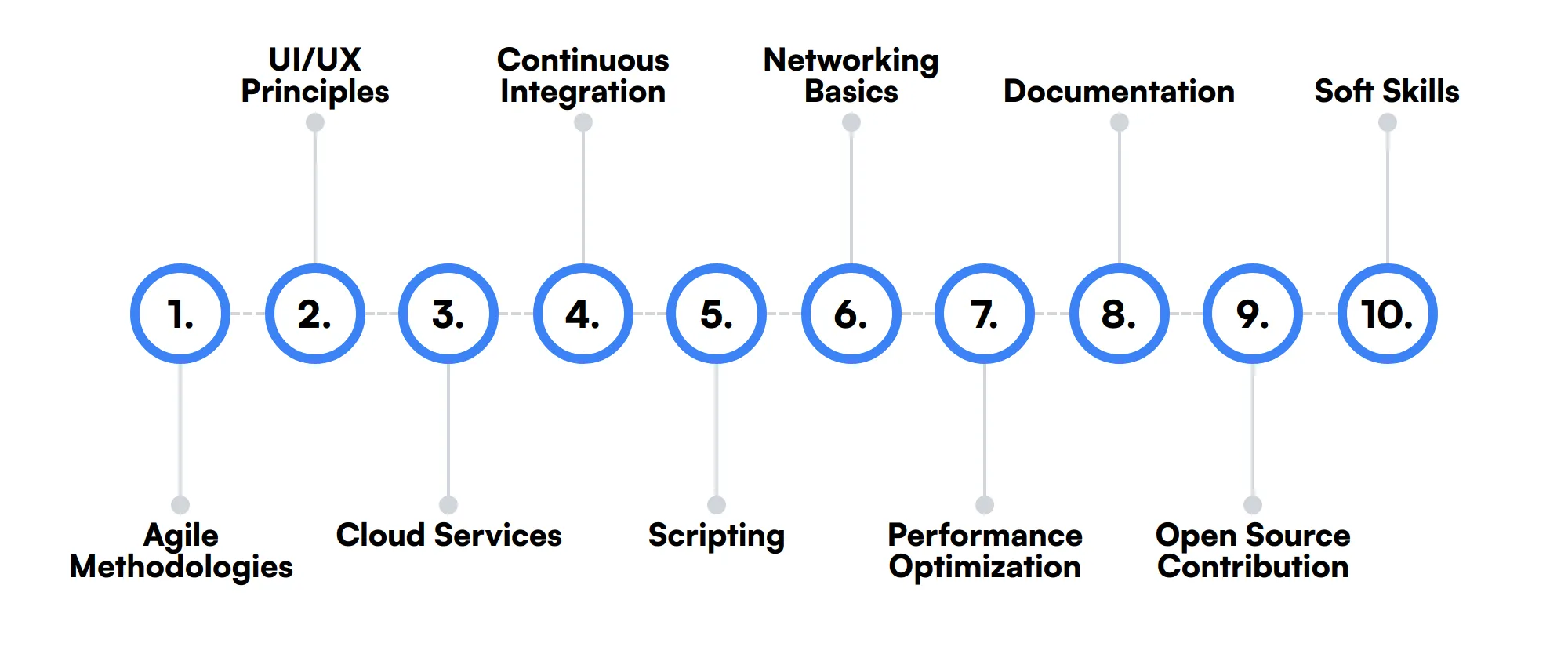
Agile Methodologies
Knowledge of Agile practices is beneficial for junior developers as it helps in adapting to the iterative and collaborative nature of modern software development projects.
UI/UX Principles
While not primarily their domain, having an understanding of user interface and user experience design can help junior developers in making informed decisions that enhance the end-user interaction with software products.
Cloud Services
Familiarity with cloud platforms like AWS, Azure, or Google Cloud can be advantageous. These platforms are increasingly used for deploying applications and managing scalable solutions.
Continuous Integration
Understanding continuous integration processes helps in automating the testing and deployment phases of software development, thereby increasing efficiency and reducing bugs in production.
Scripting
Skills in scripting languages such as Bash or Python scripts can aid in automating routine tasks and enhancing the development process.
Networking Basics
A basic understanding of networking concepts can help junior developers in troubleshooting and integrating network-related functionalities in applications.
Performance Optimization
Junior developers can benefit from knowing how to analyze and improve the performance of applications, ensuring they run efficiently under various conditions.
Documentation
Effective documentation skills are important for maintaining clear and useful project documentation, which aids in future maintenance and development efforts.
Open Source Contribution
Engaging with open source projects can enhance a developer's coding skills, provide real-world experience, and expand their professional network.
Soft Skills
Communication, teamwork, and adaptability are valuable in a collaborative environment, helping junior developers to effectively contribute to project goals and team dynamics.
How to assess Junior Software Developer skills and traits
Assessing the skills and traits of a Junior Software Developer can be a challenging task. It's not just about knowing if they can write code, but also understanding their problem-solving abilities, debugging skills, and how well they manage databases and version control. These skills are fundamental to ensuring that a junior developer can contribute effectively to your team and grow within the role.
Traditional resumes and interviews often fall short in providing a complete picture of a candidate's capabilities. This is where skills-based assessments come into play. By leveraging tools like Adaface on-the-job skill tests, you can achieve a 2x improved quality of hires and an 85% reduction in screening time. These assessments are designed to evaluate a candidate's proficiency in key areas such as programming, code testing, API integration, and basic security knowledge, giving you a clearer understanding of their potential.
Let’s look at how to assess Junior Software Developer skills with these 6 talent assessments.
Computer Programmer Coding Aptitude Test
Our Computer Programmer Coding Aptitude Test evaluates a candidate's programming skills through scenario-based MCQs and a coding question, covering programming fundamentals, data structures, and algorithm basics.
The test assesses candidates' ability to solve problems using logic, analytical thinking, and programming concepts. It evaluates their understanding of algorithms, data structures, programming paradigms, syntax, and programming logic.
Successful candidates demonstrate their ability to analyze problems, identify patterns, and develop effective solutions using programming concepts. They show proficiency in writing functional code across various programming languages.
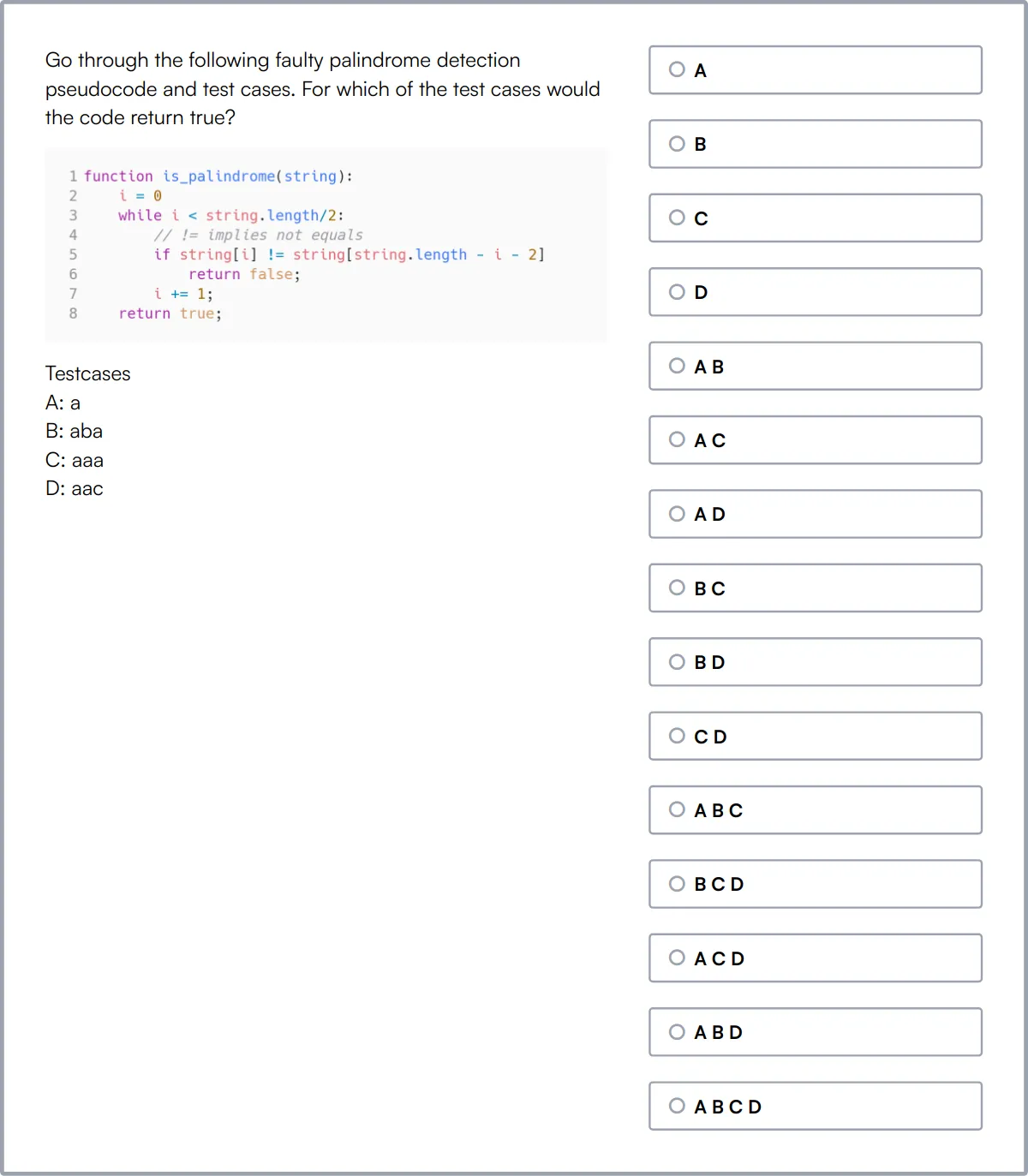
Problem Solving Test
Our Problem Solving Test measures a candidate's ability to handle complex problems through logical, spatial, and abstract reasoning, critical thinking, and data interpretation.
This test evaluates a candidate's ability to understand instructions, analyze data, and respond to complex problems or situations. It includes questions on logical reasoning, data interpretation, spatial reasoning, abstract reasoning, and critical thinking.
Candidates who excel in this test are adept at analyzing and solving diverse problems, demonstrating high learning agility and adaptability.
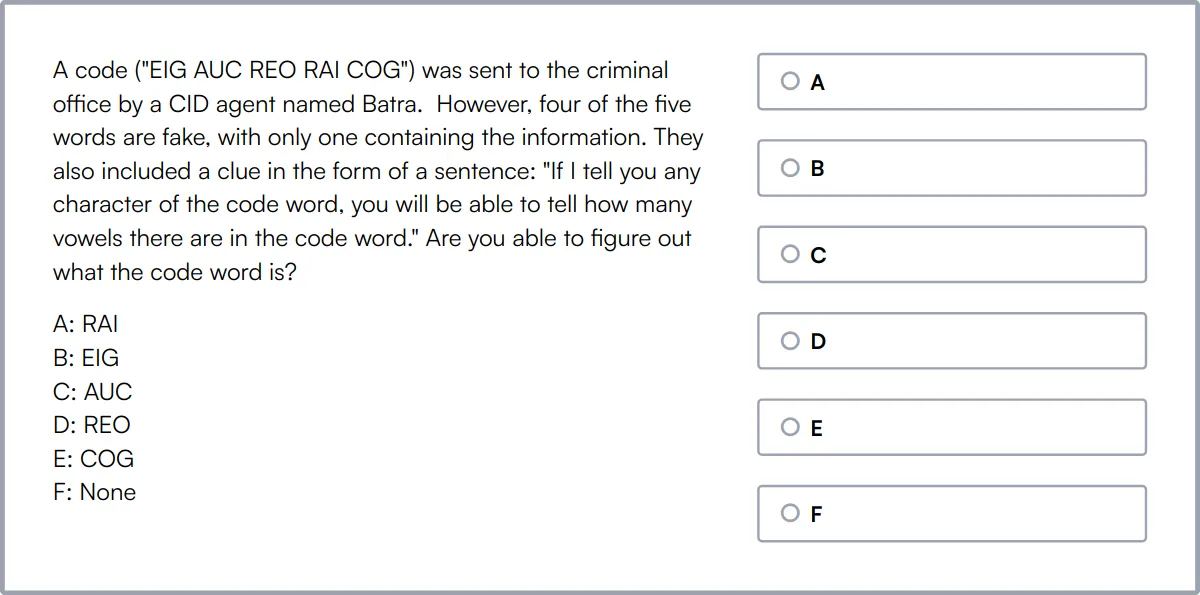
Git Online Test
Our Git Online Test assesses candidates on their understanding of Git, from basic commands to advanced repository management, including branching, merging, and conflict resolution.
The test evaluates the candidate's knowledge of Git commands, branching models, and workflows. It challenges their ability to resolve conflicts and use Git for effective source code management.
High-scoring candidates will have demonstrated a thorough understanding of Git operations, which is critical for efficient version control and collaboration in software development projects.
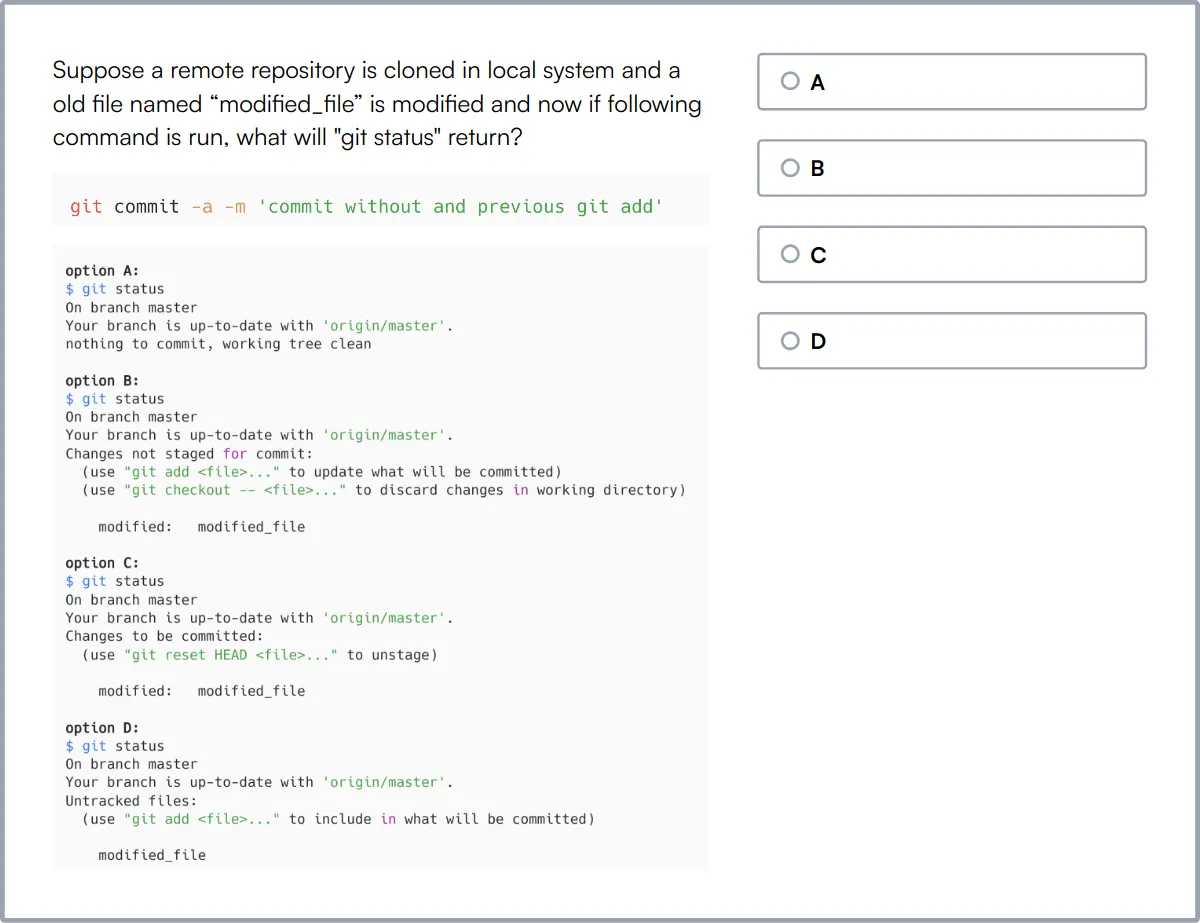
SQL Online Test
Our SQL Online Test evaluates a candidate's ability to design, build, and manage databases using SQL. It covers a range of topics from basic CRUD operations to complex queries involving joins and subqueries.
The test assesses candidates on their ability to create and manipulate databases and tables, write efficient queries, and implement security measures in database management.
Candidates who perform well on this test demonstrate a strong grasp of SQL operations, crucial for roles involving database management and data analysis.

Selenium Online Test
Our Selenium Online Test assesses candidates on their proficiency with Selenium WebDriver for automation testing, including framework building and cross-browser testing.
The test evaluates candidates' knowledge of Selenium architecture, features, and their ability to interact with live websites, perform API and database testing, and build and customize frameworks.
Successful candidates will have demonstrated their ability to use Selenium effectively for automation testing, identifying issues and ensuring software quality across different web browsers.
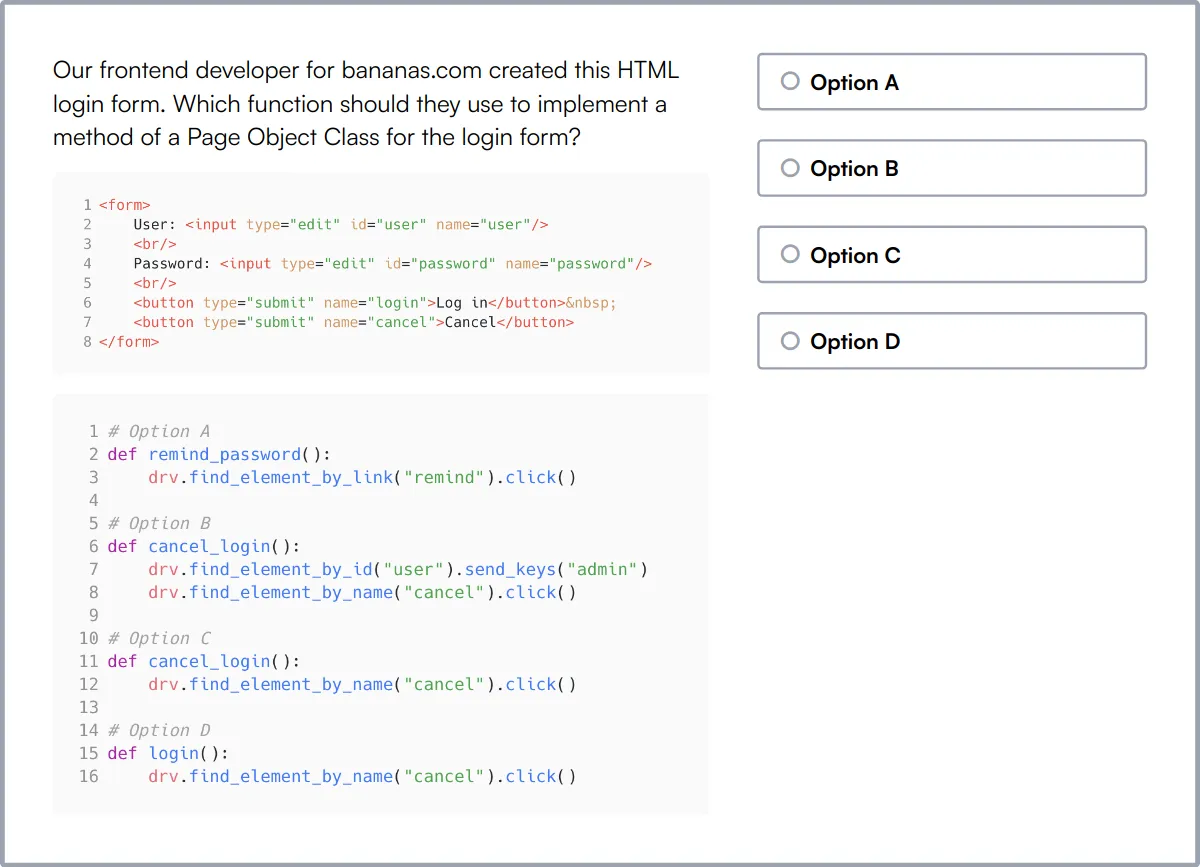
REST API Test
Our REST API Test evaluates a candidate's understanding of RESTful APIs, focusing on API integration, design, and best practices for backend services.
The test includes multiple-choice questions on REST principles, HTTP methods, status codes, authentication, and serialization formats. It also includes a coding question to assess practical skills in API development.
Candidates excelling in this test demonstrate a strong capability in designing and interacting with RESTful services, an important skill for backend and API development roles.
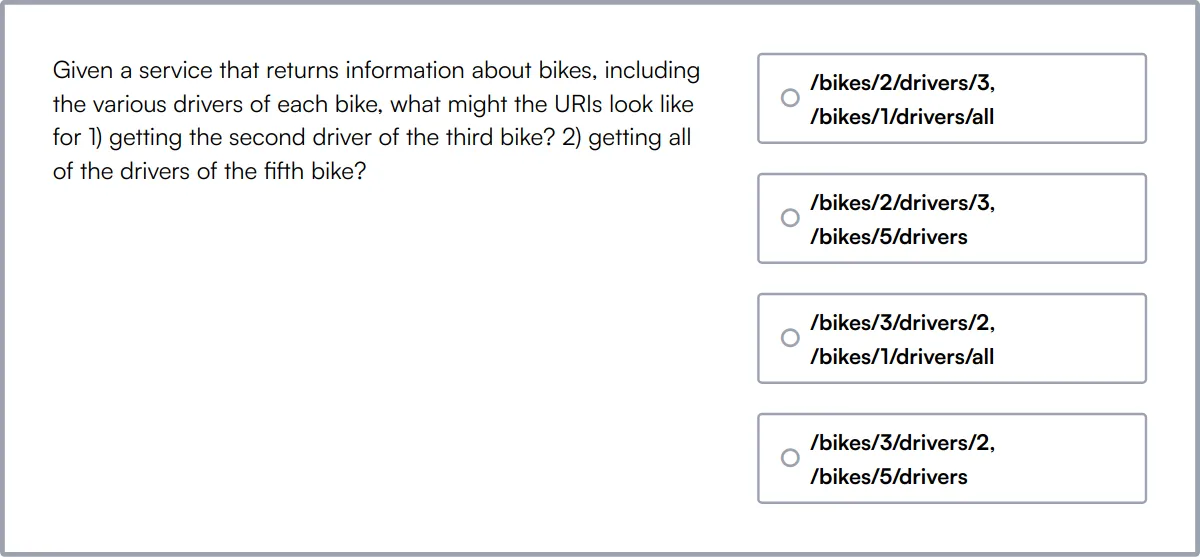
Summary: The 8 key Junior Software Developer skills and how to test for them
| Junior Software Developer skill | How to assess them |
|---|---|
| 1. Programming Proficiency | Evaluate the ability to write clean, functional code in various languages. |
| 2. Debugging Skills | Assess the capability to identify and fix code issues. |
| 3. Version Control | Check proficiency in using Git for code management. |
| 4. Database Management | Measure skills in designing and querying databases. |
| 5. Code Testing | Determine the ability to write and execute test cases. |
| 6. Problem Solving | Evaluate logical thinking and solution-finding skills. |
| 7. API Integration | Assess experience in connecting and using external APIs. |
| 8. Basic Security Knowledge | Check understanding of fundamental security practices. |
Technical Aptitude Test
Junior Software Developer skills FAQs
What programming languages should a Junior Software Developer know?
A Junior Software Developer should be proficient in at least one programming language such as Python, Java, or JavaScript. Familiarity with multiple languages is a plus.
How can I assess a candidate's debugging skills?
You can assess debugging skills by giving candidates a piece of code with intentional bugs and asking them to identify and fix the issues. Pair programming sessions can also be insightful.
Why is version control important for Junior Software Developers?
Version control, like Git, helps developers track changes, collaborate with team members, and manage code versions. It is essential for maintaining project integrity.
What should I look for in a candidate's database management skills?
Look for knowledge of SQL and NoSQL databases, ability to write queries, and understanding of database design principles. Practical experience with database management systems is beneficial.
How do I evaluate a candidate's problem-solving abilities?
Use coding challenges or algorithm-based questions to assess problem-solving skills. Real-world scenarios can also help gauge their approach to solving complex issues.
What is the significance of API integration for Junior Software Developers?
API integration allows developers to connect different software systems. Assess candidates by asking them to integrate a simple API into a project or explain how they have used APIs in the past.
How can I test a candidate's knowledge of Agile methodologies?
Ask about their experience with Agile practices like Scrum or Kanban. You can also present a scenario and ask how they would manage tasks and collaborate in an Agile environment.
What soft skills are important for a Junior Software Developer?
Important soft skills include communication, teamwork, adaptability, and time management. These skills ensure effective collaboration and project success.

40 min skill tests.
No trick questions.
Accurate shortlisting.
We make it easy for you to find the best candidates in your pipeline with a 40 min skills test.
Try for freeRelated posts
Free resources



